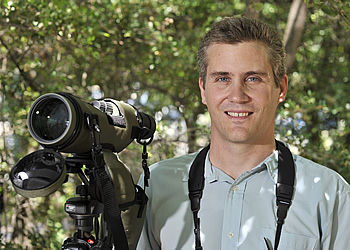 Dr. Jeff Johnson, assistant professor in the Department of Biological Sciences and the Institute of Applied Sciences, focuses his research on conservation-based questions. He is particularly interested in how this relates to birds.
Dr. Jeff Johnson, assistant professor in the Department of Biological Sciences and the Institute of Applied Sciences, focuses his research on conservation-based questions. He is particularly interested in how this relates to birds.
The scope of the projects conducted in his lab are not restricted to Texas. His lab projects range from Central America, Greenland, Africa, and Southeast Asia to Madagascar.
"My research has a strong applied component relative to active conservation management," Johnson said. "Unfortunately, many species throughout the world are in decline and the focus in my lab is to try to reverse that trend."
Johnson currently directs a lab with four graduate students and multiple undergraduate students. Their research is strongly focused on conservation biology.
"My lab works with many species or populations on the verge of extinction, and our primary goal is to provide results that can be used by managers to improve the likelihood of survival of those species. This is the kind of stuff that keeps me up at night," Johnson said.
One of the projects that Johnson and his students are working on involves the federally endangered Attwater's Prairie-chicken, a grouse species native to the Texas coastal plain that now numbers fewer than 100 in the wild. He and his lab are working with the Attwater's Recovery Team to help determine factors that are crucial for the survival of these birds after they are released from captivity.
Johnson is also working with researchers in India and the U.K. to create a 'studbook' for the captive breeding program of Oriental White-backed Vulture, Slender-billed Vulture, and Indian Vulture. These three species are critically endangered and have decreased in abundance by more than 99 percent in the past 15 years.
This decline is due to the vultures feeding on livestock carcasses, such as cattle, that were exposed to Diclofenac, a nonsteroidal anti-inflammatory pharmaceutical similar to ibuprofen used to alleviate arthritic-like symptoms. Both the Indian and the Pakistan governments banned the manufacturing and distribution of the drug a few years ago, but stockpiles still persist and a human version of the drug is available as a substitute.
Concerned parties have created a captive breeding program to prevent extinction of these species. This program is necessary to not only prevent further exposure of these birds to Diclofenac, but also to breed the birds and their eventual release back into the wild once the drug is no longer of concern. The research that Johnson is conducting will minimize the potential for inbreeding in the captive population.
He is also doing ongoing research in Greenland, which involves multiple projects. One of the projects is focused on the adaptive significance of plumage color in gyrfalcon, a large falcon that ranges in color from white to grey and almost black. He is exploring how plumage color influences adaptation in this species using a combination of field- and lab-based research. These results may better predict how animals react to a changing climate.
"An important question in the debate on the ecological effects of climate change is whether species will be able to adapt fast enough to keep up with their changing environment," Johnson said. "Knowing the evolutionary processes that had led to the current gyrfalcon distribution will help us predict how the species may respond to challenges in the future."
Johnson is also working with The High Arctic Institute monitoring bird populations in northwest Greenland near Pituffik. They are interested in recording basic demographic information on both marine and terrestrial bird species in the Arctic such as breeding success and population numbers.
"We are seeing a change in population numbers among many bird species in our study areas, presumably due to climate change and other factors related to ecology in the surrounding area," Johnson said.
Johnson is also involved with research projects conducted in collaboration with The Peregrine Fund, a non-governmental organization that works to conserve birds of prey throughout the world. He has been working with the organization since 2003.
Other collaborators include The Royal Society for the Protection of Birds, Craighead Berengia South, The Nature Conservancy, Wildlife Conservation Society and the U.S. Fish and Wildlife Service.

